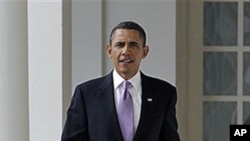President Barack Obama and his top aides say both the Egyptian government and protesters in the streets of Cairo should reject violence. The administration is balancing its support for President Hosni Mubarak’s government with calls for political reform.
President Obama and several members of his administration are calling for nonviolence on both sides of Egypt’s anti-government protests.
As he took the public’s questions Thursday on the social media video website YouTube, Mr. Obama said Egyptians need to be given mechanisms to express legitimate grievances.
"You can see these pent-up frustrations that are being displayed on the streets," said President Obama. "My main hope right now is that violence is not the answer in solving these problems in Egypt, so the government has to be careful about not resorting to violence, and the people on the streets have to be careful about not resorting to violence."
Tens of thousands of protesters in Cairo and other Egyptian cities are demanding that President Mubarak step down after almost 30 years in power.
Like several previous U.S. presidents, Mr. Obama Thursday stressed Egypt’s importance as a partner in the Middle East peace process, but said the Mubarak government must reform.
"Egypt has been an ally of ours on a lot of critical issues," said Obama. "They make peace with Israel. President Mubarak has been very helpful on a range of tough issues in the Middle East. But I have always said to him that making sure that they are moving forward on reform, political reform, economic reform is absolutely critical to the long-term well-being of Egypt."
Several members of Mr. Obama’s administration made similar statements Thursday.
The president’s Deputy National Security Adviser, Denis McDonough, also told reporters political reform is needed in Cairo.
"Things like making sure that the emergency law is lifted, things like a new elections law, things like creating the kind of space for social and democratic speech and openness, so that we can see the kind of advancement that we hope for," said McDonough.
Defense Secretary Robert Gates, visiting Canada’s capital, Ottawa, says the United States has been clear to governments in Egypt, Yemen and Tunisia about the need for political reforms.
"Human and political rights of people are fundamental, and the economic challenges that face many of the people in the Middle East, as well as elsewhere, are important as well," said Gates.
And White House spokesman Robert Gibbs, briefing reporters, said he believed Mr. Mubarak’s government is stable, and said the U.S. will not choose sides in the dispute in Cairo.
But he said political reform in Egypt cannot wait.
"This represents an opportunity for President Mubarak and for the government of Egypt to demonstrate its willingness to listen to its own people," said Gibbs.
Tunisia’s president, Zine el Abidine Ben Ali, was ousted in a popular uprising earlier this month, and demonstrators in Yemen have been demanding that their president resign.
Gibbs would not link the situations in the three Middle Eastern countries, and said each nation is at a different stage in its political development.




